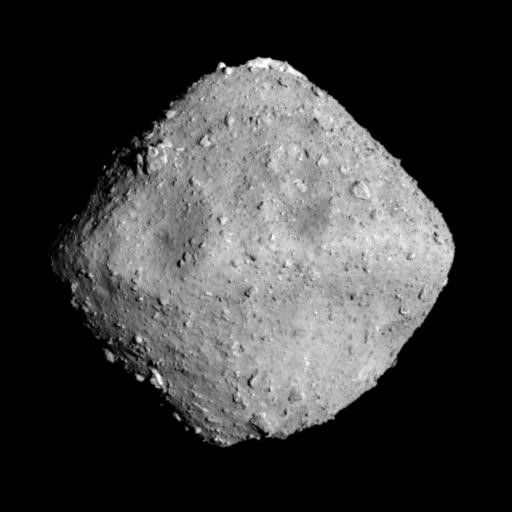
Hayabusa 2 is a Japanese spacecraft set to collect asteroid samples and return them back to Earth for analysis. So far, it's cruised some 2 billion miles through space since blasting off on its voyage to the Ryugu space rock in December 2014.
As of 8.35 p.m. ET Tuesday, Hayabusa 2 has officially "rendezvoused" with Ryugu, the Japanese Aerospace Exploration Agency (JAXA) reported. This means the spacecraft is probing the vicinity of the asteroid from a distance of just 12 miles.
The craft has gotten close enough to photograph the surface of the Ryugu space rock in detail, JAXA revealed. And those images, the agency said, aren't quite what scientists expected.
"From a distance, Ryugu initially appeared round, then gradually turned into a square before becoming a beautiful shape similar to fluorite [a vibrant mineral sometimes used in jewelry]," project manager Yuichi Tsuda said in the JAXA statement. Rather than a round dumpling, the asteroid looks like a cosmic diamond—or maybe even a spinning top—the BBC pointed out.
"Now, craters are visible, rocks are visible and the geographical features are seen to vary from place to place," Tsuda added. "This form of Ryugu is scientifically surprising and also poses a few engineering challenges."
Engineers will have to contend with a peak near the asteroid's equator, big craters and the weird gravitational forces wielded according to Ryugu's shape.
Read more: Can NASA's Mars rovers survive planet-engulfing dust storm?
"At first, we will study very carefully the surface features. Then we will select where to touch down," Hayabusa 2's mission manager Makoto Yoshikawa told the BBC. "Touchdown means we get the surface material."
Scientists want Hayabusa 2—which will probe Ryugu with a number of smaller rovers and instruments—to return samples from the asteroid's surface. They hope it could offer a bounty of organic materials and minerals combined with water. Scientists think this ancient stuff is as could be as old as the solar system. It might even help us understand the origin of Earth's water and organic matter.
But, collecting these ancient grains is no easy task.
"We have an impactor which will create a small crater on the surface of Ryugu. Maybe in spring next year, we will try to make a crater... then our spacecraft will try to reach into the crater to get the subsurface material," Yoshikawa told the BBC. "But this is a very big challenge."
Read more: Mercury stumps scientists, but this mission could finally unravel its mysteries
Hayabusa 2 follows on from JAXA's original Hayabusa mission, which launched a spacecraft towards the Itokawa asteroid back in 2003. After a few engineering hiccups, the spacecraft returned precious asteroid grains to Earth in 2010.
Before Hayabusa, NASA's Galileo visited asteroids Gaspra and Ida, and the agency's NEAR Shoemaker traveled to Eros. NASA's OSIRIS-REx is currently making its way toward asteroid Bennu, set to make contact with the space rock sometime this year.
The Japanese Aerospace Exploration Agency did not immediately respond to a request for comment.
Update | This article has been updated to include more information about the position of Hayabusa 2.
Uncommon Knowledge
Newsweek is committed to challenging conventional wisdom and finding connections in the search for common ground.
Newsweek is committed to challenging conventional wisdom and finding connections in the search for common ground.
About the writer
Katherine Hignett is a reporter based in London. She currently covers current affairs, health and science. Prior to joining Newsweek ... Read more
To read how Newsweek uses AI as a newsroom tool, Click here.








